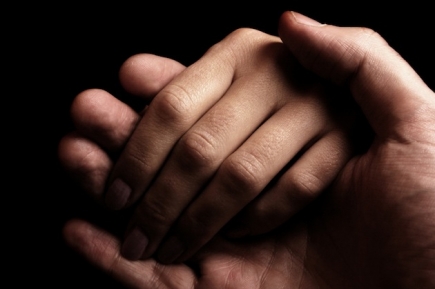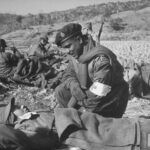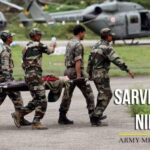Wars are not just about death, bullets, blood and guts, sometimes, we see acts of caring and compassion too. This story narrates an incident that occurred in a village in the Sialkot sector in 1965, where I was serving with my unit, 45 Cavalry. The unit was re- raised as a Light Armoured Regiment in May 1965, and was waiting for light tanks to be imported from Russia. With the onset of war, we picked up assorted tanks then in service Centurions, Shermans, AMX, etc., provided to the crew-and were assigned the role of Armoured Delivery Regiment (ADR), to supply replacement armoured vehicles and personnel for the armoured regiments. I heard the announcement of the cease fire over the tank radio. I got down to stretch my legs and exercise my limbs a bit and sat down leaning on the wall of a big brick cum mud house on the outskirts of a small village made of barely thirty dwellings. My driver gave me a most welcome glass of tea. The tea brewed in a tank has its own flavor -a bit of diesel and kerosene smell mingles with plenty of sugar. But you can’t resist it. I must have dozed off, for suddenly I was awakened by the noise of utensils hitting the ground from somewhere inside the house. Could there be some enemy soldier hiding inside the house. I thought, as I pulled my pistol out. Hugging the wall. I, approached the broken wooden door, the sole entrance to the house and moved in. Straight in front of me was an open compound, with two huge trees and a well, on whose parapet rested a bucket tied to a string. There was a rope tied between the trees, perhaps to dry clothes. To its left were five rooms, all in a row, much like a barrack Straight ahead were two rooms and a huge shed for the cattle-two buffaloes sat munching, oblivious to the danger around them. On the right side was fodder and some kind of a toilet. I cautiously approached the entrance of the room from where the noise had come and gently opened the door.
Then in front of me saw very old and frail woman with cracked spectacles. She was alone in the deserted village-this surprised me. There was a quiet resignation in her face but not an iota of fear. What are you doing here, all alone?” I asked her. “I have no place to go,” she said. This is my home, my hearth. All my memories are here. This is where I will stay till I die’ She paused for a moment, then spoke again. ‘I came here six decades ago, as a young bride. I was not even five feet tall, but my husband was a tall and handsome Punjabi, six feet six inches tall.” Her face lit up for moment, perhaps in remembrance of past times. Usman lies buried here,” she said softly, “barely two miles from this place in the village graveyard. I want to be buried by his side when my time comes. She stood up slowly. Just then, there was a barrage of artillery fire nearby and she stumbled. Instinctively, I reached out and held her hand, steadying her. Her hands were very warm and it was evident that she had a high fever. On the radio, I requested our medical officer to come over with some medicines for her. He arrived half an hour later, and after examining her, gave her medicines for fever, low blood pressure and weakness, and advised her rest. I requested the doctor to get two sets of spectacles for her from Jammu. Earlier, when I checked her kitchen, I was appalled to find that she was surviving only on a bit of atta, onions and salt. Everything else was bare and empty. Before leaving, my boys replenished her larder from our rations in the tanks and her eyes welled up with tears. ‘Puttar (Son), she said, “Please come again. May Allah protect you all. ‘Next day, sometime in the evening, I found time to meet her again. She was looking better and told me that the doctor had come and looked her up and my boys had brought her vegetables and fruits. I felt proud of my troops for their concern and insaniyat. She spoke about Usman and their early years of married life, how she would carry food and goand make him eat in the fields, and in the evenings, she would wait for him. She would draw water from the well and he would bathe. He died of snakebite a few years ago, she said, and all that she wanted was to be buried beside him when she passed away. Her story touched me deeply. My boys would occasionally stop by to check on her welfare and I too made it a point to spend some time with her. She would talk of her time with Usman and the joys and sorrows they shared together. She was lonely now, sad and uncared for The days passed, and one day, the doctor got her the new spectacles from Jammu. When I visited her, she was bubbling with joy and excitedly told me how she could now see the moon and the stars which earlier she could not do. Her face took on aradiance, which in a way reminded me of my grandmother. She then became emotional and said in Punjabi, “Puttar, tere siwa mera is duniya wich koi nahin’, which roughly translated to mean that she had no one besides me in this world. I was very moved and felt my eyes moisten. Take care of yourself,’ she said. Then she insisted that I have lunch with her a meal of saag and parathas, which she specially made for me.
A week or so later, the doctor told me that ‘Ammi had high fever and was very unwell. We had gotten used to calling her Ammi, a name we used for our own mothers. When I visited her, it was apparent that her time had come to join Usman. Her voice was weak when she spoke to me. “‘Bury me next to Usman’ was all that she said, pointing in the direction of the village graveyard. Then she drifted off to sleep. She passed away some time in the night and my boys found her in that state the next morning. We located a Maulvi in one of the Infantry battalions who, over the radio set, gave us instructions for her burial. At the village burial ground, we dug a grave and covered our heads, honouring the final prayer to the departed. The Maulvi dictated over the radio set and we followed his instructions. Finally, we all joined him in the “Dua-imaghfirat’, the seeking of forgiveness for the dead. A silence descended over the area, and my troops and I found our eyes welling up, much as if one of our own had passed away. I am glad that we could bury her in the village graveyard, which was her dying wish. I hope she meets Usman in the other world and they are together and happy once again.



